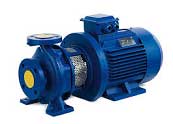Centrifugal pump best use for a changing impeller

Centrifugal pump is above all a rotodynamic pump that utilizes a turning impeller to lift the rate of a liquid. Its major function is to control the energy of a motor to kinetic energy which in twist pressures out the liquid from the pump. The transform in energy occurs in the volute and the impeller. As the volute converts the kinetic energy into pressure, the impeller changes driver energy into kinetic energy.
Mechanism
When the fluid gets to the pump segment and the impeller, the centrifugal energy is bear. The impeller upon rotating changes the liquid there in hallow pass on centrifugal speeding up and shoves itself outwards. As the fluid makes its way out from the impeller eye, a small pressure is built pulling more water into the impeller.
Multistage Centrifugal Pumps
A various processes of centrifugal pump include more than one impeller. They can be equipped on comparable or dissimilar beams. It provides two very important jobs such as throw out huge amount of fluid and produce high lead.
If elevated head is to be attained, impellers have to be equipped on the same ray in a serial prototype. If great amount of water to be forced is the main reason, then the impellers have to be fitted on several shafts.
Three Universal Categories
A
Impeller and Shafts: Vital Components
Both impeller and shafts form crucial sections of a centrifugal pump as velocity is fundamentally employed to recognize impellers reliance on their types and magnitudes. Shafts are prepared of shaft sleeves that expand to external frontage of seal gland plate to avert shaft from rust, corrosion and wear and tear. The CRI centrifugal pumps are extensively classified as Centrifugal monoblock pumps – created to carry high presentation with low temperature increase consequential to increased robustness, the monoblock CT/CF series - created to play a role in heavy voltage fluctuations and the CRI regenerative pump sets - characteristic non-self priming with finish suction and radial deliverance.









